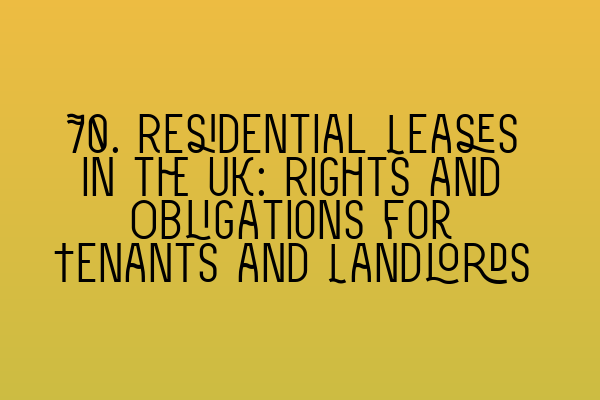Residential leases in the UK play a significant role in the rental market, providing both tenants and landlords with rights and obligations. Understanding these rights and obligations is crucial for a smooth and harmonious landlord-tenant relationship. In this blog post, we will explore the key aspects of residential leases, including the rights and obligations for both tenants and landlords.
Before we dive deeper, if you’re preparing for the SQE 1 exam, check out our SQE 1 Practice Exam Questions or SQE 1 Practice Mocks FLK1 FLK2 to boost your preparation. We also offer comprehensive SQE 2 Preparation Courses and SQE 1 Preparation Courses to help you excel in your exams. Stay up to date with the latest SRA SQE Exam Dates on our website.
Now, let’s proceed to delve into the world of residential leases.
## Overview of Residential Leases
A residential lease is a legally binding agreement between a landlord and a tenant that grants the tenant the right to use and occupy a property for a fixed period. This agreement outlines the terms and conditions that both parties must adhere to throughout the tenancy.
## Rights and Obligations for Tenants
As a tenant, it is essential to understand your rights and obligations under the residential lease. Here are the key aspects to consider:
### Right to Exclusive Possession
One of the essential rights a tenant has is the right to exclusive possession of the property. This means that the landlord cannot enter the property without the tenant’s permission, except in certain circumstances such as emergencies or with proper notice for repairs and inspections.
### Payment of Rent
Tenants have the obligation to pay rent on time as specified in the lease agreement. Failure to pay rent can lead to legal consequences, including eviction.
### Repairs and Maintenance
While the landlord is responsible for maintaining the structure and exterior of the property, tenants are generally responsible for minor repairs and upkeep of the property’s interior. However, it is crucial to review the lease agreement to determine the specific repair obligations.
### Right to Quiet Enjoyment
Tenants have the right to peace, quiet, and privacy during their tenancy. Landlords cannot interfere with this right by entering the property without proper notice or taking any actions that disturb the tenant’s peace.
### Compliance with Rules and Regulations
Tenants must comply with any rules and regulations outlined in the lease agreement, including restrictions on pets, noise levels, and alterations to the property. Failure to comply with these rules can result in penalties or even termination of the lease.
## Rights and Obligations for Landlords
Landlords also have their own set of rights and obligations under residential leases. Let’s explore these aspects:
### Right to Receive Rent
The landlord has the right to receive rent from the tenant as agreed upon in the lease agreement. It is essential for landlords to set clear expectations regarding rent payment dates and methods to avoid any disputes.
### Maintenance and Repairs
Landlords have a legal duty to ensure the property is safe and fit for habitation. Major repairs and maintenance are typically the responsibility of the landlord, ensuring that the property meets all necessary health and safety standards.
### Access to the Property
While tenants have the right to exclusive possession, landlords also have the right to access the property for inspections, repairs, and emergencies. However, landlords must provide reasonable notice to tenants before entering the property, except in emergency situations.
### Protection of Tenancy Deposits
Landlords are required by law to protect any tenancy deposits received from tenants in a government-approved scheme. This ensures that tenants’ deposits are safeguarded and can be returned once the tenancy ends, subject to any agreed deductions.
### Compliance with Rent Increase Regulations
Landlords must adhere to the regulations regarding rent increases. In most cases, landlords can only increase the rent after the fixed-term period ends, and they must provide proper notice to tenants.
It is important to note that this blog post covers only the basics of residential leases in the UK. If you require detailed legal advice or have specific questions about your lease agreement, it is best to consult a qualified solicitor specializing in property law.
In conclusion, understanding the rights and obligations of tenants and landlords in residential leases is vital for a successful tenancy. By familiarizing yourself with these key aspects, you can ensure a smooth and harmonious relationship during your tenancy.
If you found this article helpful, make sure to explore our website for more informative content and resources related to property law, lease agreements, and preparation for the SQE exams.
